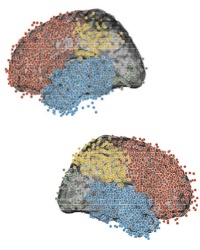Almost everyone, young and old, has experienced a memory chain. Perhaps you are reminiscing upon your favorite foods, and all of a sudden you think of your grandmother's kitchen. One memory of food, vibrant and sensory, triggered another less prominent memory of your grandmother.
Now, an explanation for this neural linkage has been provided by University of Pennsylvania researchers through the first neurobiological evidence of the theory of episodic memory, or the memory of autobiographical events.

 The study was led by Professor Michael Kahana of the Department of Psychology in the School of Arts and Sciences and graduate student Jeremy Manning of the Neuroscience Graduate Group in the Perelman School of Medicine. The two worked in collaboration with Gordon Baltuch and Brian Litt. Their research was published in the journal of Proceedings of the National Academy of Science.
The study was led by Professor Michael Kahana of the Department of Psychology in the School of Arts and Sciences and graduate student Jeremy Manning of the Neuroscience Graduate Group in the Perelman School of Medicine. The two worked in collaboration with Gordon Baltuch and Brian Litt. Their research was published in the journal of Proceedings of the National Academy of Science.
(Images are courtesy of UPenn)
"It's like mental time travel. [The person] jumps back in time to the past, but [he or she is] still grounded in the present" says Kahana.
The study's participants were all epilepsy patients. The data necessary for this study was hard to acquire. It required recording precise brain activity data that could only be acquired through a certain amount of electrodes implanted throughout the patients brains.
"[We] can only obtain these recordings when neurosurgical patients, who require implanted electrodes for seizure mapping, volunteer to participate in memory experiments... With these recordings, we can relate what happens in the memory experiment on a millisecond-by-millisecond basis."
 The study was conducted through having subjects memorize and remember a list of random words. After studying the sequence of words, the subjects were distracted by doing simple math problems, then were tasked with recalling the words in any order. Their brain activity was measured reliably with their implants, and the test was repeated upon each subject multiple times to ensure accuracy.
The study was conducted through having subjects memorize and remember a list of random words. After studying the sequence of words, the subjects were distracted by doing simple math problems, then were tasked with recalling the words in any order. Their brain activity was measured reliably with their implants, and the test was repeated upon each subject multiple times to ensure accuracy.
(image courtesy of Upenn)
"What seems to be happening is that when patients recall a word, they bring back not only the thoughts associated with the word itself but also remnants of thoughts associated with other words they studied nearby in time" Manning said.
These discoveries provide a neurological explanation of the extraordinary memories that people experience daily.
This research was supported by the National Institutes of Mental Health and the Dana Foundation.
Article courtesy of University of Pennsylvania
Such research is made possible only by the funding of these and other foundations and government institutions. If you are a biomedical/neurological researcher or laboratory manager in the Northeast and wish to explore the technologies that make such findings possible, visit Biotechnology Calendar, Inc.'s 3rd Annual Ithaca BioResearch Product Faire™ Front Line Event at Cornell University, NY. Click below for more information:


